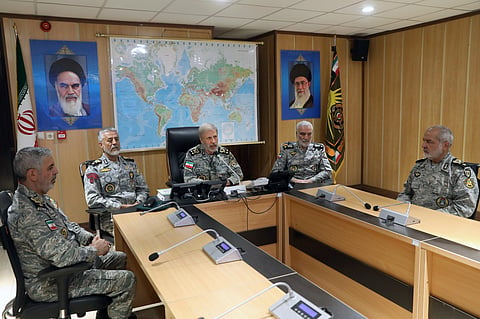

DUBAI: Iran’s underground enrichment site at Fordo was again attacked on Monday, Iranian state television reported.
The report, also carried by other Iranian media, offered no word on damage nor who launched the assault.
However, Israel has conducted airstrikes throughout the day in Iran.
The United States launched a major attack Sunday on three Iranian nuclear sites, including Fordo, which required the use of sophisticated bunker-buster bombs.
Iran fired a salvo of missiles and drones on Monday at Israel while also warning the United States that its military has been given a “free hand” to attack American targets in the wake of the Trump administration's massive strikes on Iranian nuclear sites.
Meanwhile, the head of the United Nations nuclear watchdog said on Monday that “very heavy damage” is expected at Iran’s underground facility at Fordo after a U.S. airstrike there with sophisticated bunker-buster bombs.
With the strikes on Sunday on Iranian nuclear sites, the United States inserted itself into Israel’s war, prompting fears of a wider regional conflict. Iran said the U.S. had crossed “a very big red line” with its risky gambit to strike the three sites with missiles and 30,000-pound bunker-buster bombs.
Israel said its defense systems were operating to intercept the latest Iranian threat, which apparently targeted the north and central areas of the country, and told people to head to shelters. Iran described the attack as a new wave of its Operation “True Promise 3,” saying it was targeting the Israeli cities of Haifa and Tel Aviv, according to Iranian state television.
Explosions were also heard in Jerusalem. There were no immediate reports of damage.
In Iran, witnesses reported Israeli airstrikes hit areas around Iran’s capital, Tehran, midday. It wasn’t immediately clear what had been targeted.
In Vienna, Rafael Mariano Grossi, the head of the International Atomic Energy Agency, said that given the "explosive payload utilized and the extreme vibration sensitive nature of centrifuges, very significant damage is expected to have occurred.”
He added that “at this time, no one, including the IAEA, is in a position to have fully assessed the underground damage at Fordo.”
Also Monday, Iranian Gen. Abdolrahim Mousavi, the chief of joint staff of armed forces, warned Washington its strikes had given Iranian forces a “free hand “ to "act against U.S. interests and its army.”
Tens of thousands of American troops are based in the Middle East, many in locations within range of short-range Iranian missiles.
The U.S. described its Sunday attack on the Fordo and Natanz enrichment facilities, as well as the Isfahan nuclear sit, as a one-off to take out Iran's nuclear program, but President Donald Trump has warned of additional strikes if Tehran retaliates.
Mousavi described the American attack as violating Iran’s sovereignty and being tantamount to invading the country, the state-run IRNA news agency reported.
In the wake of the American attacks on Iran, calls came from across the globe for de-escalation and the return to diplomacy to try and resolve the conflict.
On Monday, the European Union's top diplomat said the bloc remained “very much focused on the diplomatic solution.”
“The concerns of retaliation and this war escalating are huge,” Kaja Kallas said at the start of a foreign ministers’ meeting in Brussels where Iran has jumped to the top of the agenda.
“Especially closing of the Strait of Hormuz by Iran is something that would be extremely dangerous and not good for anybody,” Kallas said, referring to a maritime route crucial for oil transport.
After Sunday's attacks, Iranian officials repeated their longtime threats of possibly closing the key shipping lane.
Iran, which insists its nuclear program is for civilian purposes only, previously agreed to limit its uranium enrichment and allow international inspectors access to its nuclear sites under a 2015 deal with the U.S., France, China, Russia, Britain and Germany in exchange for sanctions relief.
But after Trump pulled the U.S. unilaterally out of the deal during his first term, Iran began enriching uranium up to 60% — a short, technical step away from weapons-grade levels of 90% — and restricting access to its nuclear facilities.
As he arrived in Brussels on Monday for a meeting with his EU counterparts, German Foreign Minister renewed calls for Iran to agree again to direct talks with the United States but says Europe still has a role to play.
“We already made it very clear to the Iranian side that a real precondition for a settlement to the conflict is that Iran be ready to negotiate directly with the U.S.,” he said, while adding that the European group known as the E3 “will contribute what we can.”
Iranian Foreign Minister Abbas Araghchi was meeting on Monday in Moscow with Russian President Vladimir Putin, one of Iran's key allies.